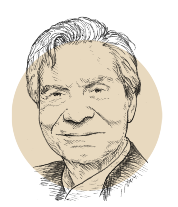French intellectuals love ideological quarrels; it is their raison d’être. And when the United States invites itself into the debate, it further fans the flames. After all, America has divided us for two centuries. Alexis de Tocqueville started things off by seeing France’s future in America. As soon as Democracy in America was published, he was contradicted by other intellectuals, such as Philippe Buchez, a follower of social Catholicism who was hostile to Protestant individualism. This anti-American influence was well established at the time and is still around today. It has been particularly defined by hostility to capitalism, from the 19th century until now, emanating from both conservatives and the Marxist left. Not many people know that France’s best-selling book in the 1930s was Georges Duhamel’s America, the Menace: Scenes from the Life of the Future. The author furiously condemned American society and its mechanization, seeing it as a threat to the warmth of French civilization. What of the pro-American intellectuals? They were rare, and they still are. Jean-Jacques Servan-Schreiber is one of the few who comes to mind. His 1967 book, The American Challenge, was a worldwide success, paying tribute to the spirit of enterprise and innovation that overshadowed the bureaucratic Europe of the 1960s.
Returning to the present day, we see that the United States has made two successive incursions into French controversies: #MeToo and wokeness. These are drawn from the same sensibility. In both cases, a social and cultural movement has come to the defense of the weak and oppressed – or so they claim – against the powerful, who are demoted and punished, or at least deserve to be. #MeToo has divided French men and women, more by generation than by political affiliation. The youth of both sexes took up the cause without much hesitation; as a result, they have generally adapted their behavior. Equality of the sexes has therefore become the norm. But this is less evident among those who are older; a famous 2018 petition, signed in particular by national icon Catherine Deneuve, praised seduction à la française in opposition to supposed American puritanism.
Wokeness, and being for or against it, is now the flavor of the month. Judging by the number of columns published in the French press, the anti-woke are winning. Viewed from France by a majority of intellectuals, the United States appears to be carried away by a hurricane of censorship. Across the U.S., statues are being toppled, both literally and figuratively, speakers are being canceled, and books are being censored. American wokeness therefore appears detestable. But anti-wokeness, which promotes an image of the White male at war with inclusivity, transgenderism, and cancel culture, is no better. Of course, this perception of American controversies is simplistic. Viewed from France, only a caricatural picture emerges. On the one hand, students in search of a cause are censoring any supposedly conservative academics or anyone seen as protecting the old world. Is this woke, or in fact the legitimate demands of oppressed minorities? On the other hand, Florida Governor Ron DeSantis has become a self-styled champion of freedom of speech. Yet in the name of this sacred value, he is banning all books referencing racism from public schools, as if it did not exist in the United States.
These symmetrical parodies of both wokeness and its opponents enable French intellectuals to position themselves as the absolute defenders of freedom of thought – while claiming that this is under threat in America. France’s culture minister Rima Abdul Malak, who is familiar with the U.S. after four years at the French embassy’s cultural services, has stepped onto the frontline of this battle by publicly voicing her support for creative freedom against censorship. That’s all well and good, but this posture should not replace the substance of the debate.
Let’s try to look at things from the opposite perspective: France seen from the United States. Americans could not imagine a minister of culture. Artistic creation in the U.S. is largely private; the states have little involvement and culture is no worse off for it. The truth is that the French Ministry of Culture exists only to compensate for the weakness of its country’s philanthropy. And what of the French intellectual, an unknown species in the United States? In America, historians study history, writers publish novels, and painters produce paintings. But in France, painters, artists, sociologists and psychoanalysts are expected to take a position on everything, especially on things beyond their expertise. In the end, we forget that Voltaire was a historian, a playwright, and a novelist; we remember only that he defended oppressed minorities. Who still reads the philosophical works of Jean-Paul Sartre? But we remember the militant revolutionary who supported Mao Zedong and Fidel Castro.
French intellectuals may therefore be using American wokeness and anti-wokeness to take a defensive stance without actually examining the deeper causes of the looming revolution. This is a pity, as wokeness did not appear out of nowhere. In fact, it highlights the issue of real equality versus virtual equality – in both our countries.
Editorial published in the April 2023 issue of France-Amérique. Subscribe to the magazine.












